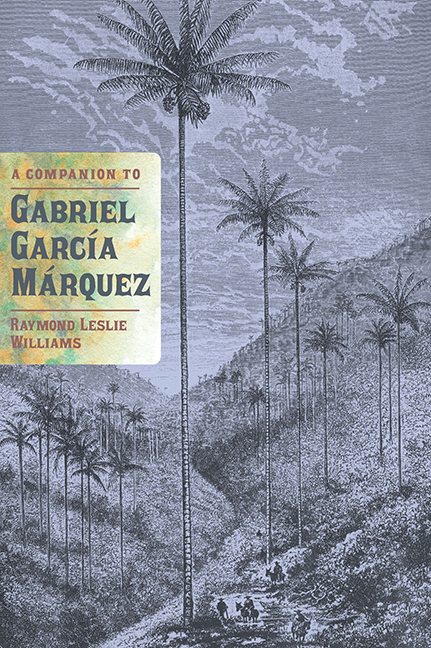Book contents
- Frontmatter
- Dedication
- Contents
- Abbreviations
- Foreword
- 1 García Márquez, the Modernists, and the Boom
- 2 Cien años de soledad and the Macondo Cycle
- 3 El otoño del patriarca and the Political Writings
- 4 Postmodern Gestures: El amor en los tiempos del cólera, Crónica de una muerte anunciada, and La increíble y triste historia de la cándida Eréndira y de su abuela desalmada
- 5 Recent Writing
- 6 Epilogue
- Guide to Further Reading
- Select Bibliography
- Index
1 - García Márquez, the Modernists, and the Boom
Published online by Cambridge University Press: 26 May 2022
- Frontmatter
- Dedication
- Contents
- Abbreviations
- Foreword
- 1 García Márquez, the Modernists, and the Boom
- 2 Cien años de soledad and the Macondo Cycle
- 3 El otoño del patriarca and the Political Writings
- 4 Postmodern Gestures: El amor en los tiempos del cólera, Crónica de una muerte anunciada, and La increíble y triste historia de la cándida Eréndira y de su abuela desalmada
- 5 Recent Writing
- 6 Epilogue
- Guide to Further Reading
- Select Bibliography
- Index
Summary
Gabriel García Márquez is one of the major modernist writers of the West in the twentieth century. He belongs to a generation of Latin American novelists who were devotees of William Faulkner and other modernists; excited by reading the modernists of North America and Europe, these Latin American writers conceived the bold ambition of modernizing Latin American literature. Along with the Cuban Alejo Carpentier, the Guatemalan Miguel Angel Asturias, the Mexican Carlos Fuentes, the Peruvian Mario Vargas Llosa, the Argentine Julio Cortázar, and others, García Márquez has committed a lifetime to this project.
In addition to the desire to be modern, García Márquez has consistently pursued other interests. First, he has been concerned with the social, economic, and political realities of his homeland of Colombia and of Latin America as a whole. Second, he was reared in an oral culture and has often explored ways of incorporating the oral tradition into his writing. Third, he has been drawn to the visual arts and has found innovative ways of utilizing them in his fiction, all of which is structured around central visual images. Finally, he has been consistently engaged in exploring, questioning, and satirizing the remnants of medieval and feudal societies that still survive in Latin America some five centuries after the arrival of the Spanish and Portuguese colonizers. A noteworthy aspect of the medieval in Latin America that has interested García Márquez is its hybrid nature, with the presence of African, Arabic, and indigenous cultures in this region.
Gabriel José García Márquez was born in Aracataca, Colombia, in 1927. The son of telegraphist Gabriel Eligio García and Luisa Santiaga Márquez, he was reared from an early age by his grandparents, Colonel Nicolás Márquez and Tranquilina Iguarán, in Aracataca after his parents left him in their care when his father took a job elsewhere. Both grandparents were essential contributors to García Márquez's later writing. His grandfather had been a hero in Colombia's civil wars and was a prominent member of the Liberal Party.
From the beginning of his career to today, García Márquez has often noted the importance of his grandmother and his aunts in his formation as a storyteller, claiming that he had learned everything that was important to him by the time he was eight years old.
- Type
- Chapter
- Information
- A Companion to Gabriel García Márquez , pp. 1 - 32Publisher: Boydell & BrewerPrint publication year: 2021



